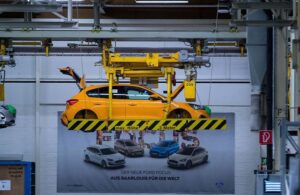Ford Motor has decided to build next-generation electric vehicles at its factory in Spain.
 Stuart Rowley, head of Ford of Europe, said the shift to electric cars would result in a significant reduction of the company’s workforce both at the Spanish plant in Valencia and at the German plant that was in the running to build the next EV model.
Stuart Rowley, head of Ford of Europe, said the shift to electric cars would result in a significant reduction of the company’s workforce both at the Spanish plant in Valencia and at the German plant that was in the running to build the next EV model.
“Bringing our all-new electric vehicle architecture to Spain will help us build a profitable business in Europe,” Rowley told reporters at a telephone conference.
The decision marks a milestone in Ford’s efforts to reorient its business in the region as European electric-vehicle sales continue to grow rapidly.
The shift is being accelerated by high prices at the pump and stricter regulation of tailpipe emissions.
The European Parliament earlier this month voted in favor of banning the production of new vehicles with internal combustion engines in 2035. If approved by EU member states, the move would force the entire industry to shift to EVs.
Ford, which has struggled with profitability in Europe, has been using the shift to electric vehicles as leverage to restructure its European business, which has included moving production to lower-cost sites such as Turkey and Eastern Europe.
Ford will begin producing electric cars for Europe next year in Cologne, Germany, using technology it licenses from Volkswagen AG.
In its existing plant in Valencia, Ford will produce a line of electric cars beginning later this decade using its technology.
Ford said it currently employs 41,000 people across 14 manufacturing plants in Europe, including 6,000 people in Valencia, and around 20,000 in Germany at its plants in Cologne, Saarlouis and Aachen.
Ford builds its Focus compact car, a model it no longer sells in the U.S., in the Saarlouis plant. Rowley said the plant will continue to build the Focus until 2025 but its future was unclear beyond that.
Ford held an internal beauty contest between Saarlouis and Valencia as it sought the best location to build its next-generation EVs for at least six months, engaging in intense negotiations with stakeholders, employees and government officials at both sites, ultimately choosing Spain over Germany.
Rowley declined to comment in detail on the reasons behind the decision, but analysts point out that Germany’s higher wages and energy costs weaken its competitiveness.

